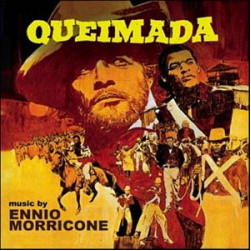QUEIMADA (1969)
Queimada is an Italian war drama starring the legendary Marlon Brando. He plays a British secret government agent named Sir William Walker, who travels to the fictional Caribbean island of Queimada, and manipulates the island’s local slaves into revolting against the colonial Portuguese regime – all so that the British can then come in and take over the island’s lucrative sugar cane industry. However, the British prove to be no less ruthless than the Portuguese were, and so the natives – led by the passionate, idealistic José Dolores (Evaristo Márquez) – organize another rebellion; except that, this time, Walker is on the other side. The film was directed by Gillo Pontecorvo, whose previous film was The Battle of Algiers, and is a damning indictment of colonialism , Machiavellian politics, and betrayal, and was a success with critics.
The cornerstone of Morricone’s score is, of course, the astonishing opening cue “Abolição,” a Portuguese word which means something like ‘abolition’ or ‘suppression’. The power of the piece of quite amazing – it begins with a church organ playing a simple repetitive melody, but then over the course of five minutes it gradually picks up a mixed voice choir chanting the word over and over, tribal percussion, electric guitar riffs, and even a flourish from a solo trumpet. By the end of the piece the ensemble has almost worked itself into a frenzy, calling for freedom and deliverance from oppression, that is just astonishing. Morricone performed the piece frequently in concert as an encore and it invariably brought the house down – how could it not?
The rest of the score is made up of half of dozen or so recurring themes, many of which receive variations and recapitulations as the score progresses. The Queimada Theme itself is actually a quite lovely piece in itself, taking both the orchestrations and the chanted word from “Abolição” but making it almost laid-back, tropical, and inviting, especially in the opening “Prima,” and later in “Pezzo Classico,” . Many of the other cues which feature the same stylistics are quite restrained, and sometimes tense, combining sinister strings with tribal percussion and vocals to illustrate the knife-edge political climate in the country; “Anche i Portoghesi Muoiono,” “Libertà,” “La Civiltà dei Bianchi,” the vivid “Seconda,” and “William e José” are excellent examples of this.
The “Verso Il Futuro” motif takes the secondary melody from “Abolição” arranges for electric guitars, and combined it with a somewhat bleak-sounding choral lament, although the choral harmonies in “#4” and “#7” are lovely. The theme for “José Dolores” is a simple, rustic piece for guitar, percussion, and Hammond organ, but the lovely string harmonies as the theme develops are really quite beautiful, and speak to his good heart and desire to lead his people to freedom. Later, “Generalissimmo” combines the José Dolores theme with the main Abolição choral element t excellent effect. The final standout piece is “Osanna,” a rich exploration of religious choral majesty interspersed with calm tribal drumbeats and statements of the “Abolição” motif in juxtaposition – again, the clash between the natives, the Portuguese, and the English. It’s quite brilliant.
Given its popularity, Queimada has been released on CD several times over the years, including a well-liked 1996 multi-score release from Vivi Musica which combines nine highlight cues with music from The Good the Bad and the Ugly, Il Mercenario, and La Resa dei Conti, among others. The release reviewed here is the 500-copy limited edition of the standalone score released in 2012 by GDM/Legend, which expands the running time to over an hour. This is an essential Morricone release, if for no other reason than “Abolição” being an all-time great.
Track Listing: 1. Abolição (5:06), 2. Queimada Prima (1:28), 3. Anche i Portoghesi Muoiono (1:19), 4. Pezzo Classico #1 (0:44), 5. Libertà (1:42), 6. Verso Il Futuro (4:36), 7. Jose Dolores (1:27), 8. La Civiltà dei Bianchi (2:22), 9. Jose Dolores #2 (0:43), 10. Una Nuove Nazione (0:41), 11. Verso Il Futuro #2 (0:58), 12. Queimada Seconda (4:03), 13. Preparazione (1:45), 14. Generalissimo (1:27), 15. Pattuglia (2:31), 16. Osanna (4:18), 17. Verso Il Futuro #3 (1:14), 18. Canna da Zucchero (1:11), 19. Verso Il Futuro #4 (1:59), 20. William e José (1:45), 21. Jose Dolores #3 (1:27), 22. Verso Il Futuro #5 (1:58), 23. Pezzo Classico #2 (0:48), 24. Studi Per Un Finale (3:26), 25. Preparazione #2 (3:15), 26. Marcia (1:11), 27. Verso Il Futuro #6 (1:56), 28. Queimada Seconda #2 (0:42), 29. William e José #2 (1:13), 30. Verso Il Futuro #7 (4:53), 31. Studi Per Un Finale #2 (1:55). GDM/Legend 4219, 64 minutes 03 seconds.












